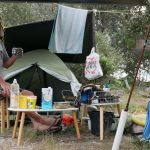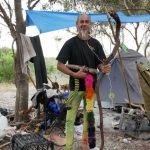Boomers take to forests to seek solace and avoid costs

MELBOURNE: Boomers are increasingly taking to living in forests to shed costs and live as part of the natural world.
Living in a tent in the scrubby sand hills north of Byron Bay, in northern New South Wales, Roger Maloney has carefully cultivated a life outside of regular society.
His campsite is meticulous — a patch of fake grass keeps sand out of his tent, his cast iron cookware sits on the ground in symmetrical order, and his surfboard and $10 golf clubs stand within arm’s reach of a matching white melamine stool and occasional table.
Mr Maloney began living in the bush about 20 years ago after a workplace accident while bricklaying in Cairns.
“I decided to go the lone ranger and fend for myself,” Mr Maloney said.
But the semi-permanent presence of Mr Maloney and others living in the dunes and bushland along the coastline is creating a headache for coastal communities and authorities.
The Arakwal people of Byron Bay, who were this year awarded native title of the area, have said the campers do not have permission to be there and are causing damage to their country and showing disrespect to their culture.
“This reserve is part of the Arakwal people’s country and has cultural significance to the Arakwal, who have maintained links with country that include the reserve since non-Aboriginal settlement,” said Sharon Sloane, the general manager of the Bundjalung of Byron Bay Aboriginal Corporation.
“Some campers are causing damage to the environment, and threatened species are being further threatened by campers.
“Bushwalkers are feeling threatened and unsafe in this vicinity.
“Fires have occurred as a result of illegal campers and we do not support this at all.
“Our corporation works with many landholders to protect country in our native title area so that it is safe from damage.
A report commissioned by the New South Wales Council of Social Services into the social and economic disadvantage of people in regional areas shows 900,000 people across the state are living below the poverty line, half of them in regional areas.
The council’s president, Tony Davies, said there was a perception among city-based politicians that the cost of living in regional areas was lower, but in fact about 20 per cent of regional families were living on about $100 a week after paying their rent and bills.
“We know that pretty much across the whole of the north coast we’ve got increasing numbers of people who are living in the coastal reserves, from Fingal right down to Stockton near Newcastle,” Mr Davies said.
“If you are on a casual salary or working in the seasonal tourist industry, you don’t get a lot of income.
“And then we’ve got, on top of that, the drought, and agricultural industries are not producing the income they used to.”
Inspector Matt Kehoe from Tweed-Byron Police agreed the number of campers was growing and moving them on was proving difficult.
He said part of the problem was the range of authorities responsible for the land on which people are camping.
Last week, police targeted bushland at Brunswick Heads under Crown Lands jurisdiction.
In March, they evicted two people from the nearby national park who had accumulated three truck loads of rubbish.
“It is quite difficult,” Inspector Kehoe said.
“We have to go in there with maps because some areas are administered by Crown Lands, some by National Parks and some by Byron Shire Council, and they are all quite close to each other.”
A spokesperson for Crown Lands said more operations to evict illegal squatters would take place in the lead-up to the Christmas holiday period.
The council said that while it did not support illegal camping, it recognised the people living in the dunes were often vulnerable members of society.
“We are doing all we can to deter illegal camping via continued enforcement and issuing of fines,” a spokesperson said.
The council has recently recruited a public space liaison officer to help connect the bush campers with government services and agencies.
In the bush, the campers interviewed said they were content with their living situation.
Peter said the pace of life and serenity of the bush helped his mental health, which was impacted by a violent home invasion last year.
“I don’t destroy the environment — quite the opposite,” he said.
“It’s just conducive for my health to be surrounded by trees.
At an another campsite, ‘Boogie’ said his decision to go bush stemmed in part from the trauma of his baby son’s death.
“I don’t like living in walls, I don’t like being boxed in,” Boogie said.










